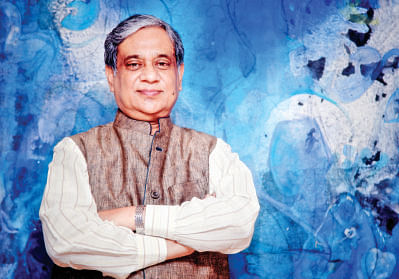Unfolding a musical Master plan
Unfolding a musical Master plan
In conversation with Bengal Foundation Chairman Abul Khair

The Bengal Classical Music Festival -- Bangladesh 2014, returning to the Army Stadium in less than a fortnight, has already been established as the world's biggest festival of classical music -- in terms of the stature and number of performers, attendance and duration. This year, tens of thousands signed up within the first three days after registration opened early this month. Abul Khair, Chairman of Bengal Foundation and the mastermind of this festival of mammoth proportions, spoke to The Daily Star about his vision and the festival. Excerpts:
“I was very fortunate to have neighbours like Zainul Abedin, Sohrab Hossain and Ustad Phool Mohammad as a child; I grew up listening to music, mostly without understanding or appreciating it. But it got embedded in me. Then in our home at Old Dhaka, we used to have cultural addas; my family was closely involved with cultural activities and sports. And I began thinking that Bangladesh's role is the most important in promoting, propagating and popularising what is now called Indian Classical Music to the world; before partition, this was Indian classical because we were all part of greater India. The people who took our classical music and dance to the world, were Imdad Khan, Enayet Khan, Vilayat Khan, Bade Ghulam Ali Khan, Ali Akbar Khan, Uday Shankar, Ravi Shankar -- all had their roots here in Bangladesh. It's in our bloodstream. Then where did it go?"
“Classical music cannot generate income; it is patronised -- by zamindars, kings or a government. After partition, the great artistes moved to India. And the market died out, because there was no livelihood through classical music. Around 15 years ago, we started a classical music school called 'Parampara', but it failed because the teachers that we'd brought -- Ustad Mashkoor Ali Khan and Shanti Sharma, came and taught sparingly, but whenever they left, the students' perseverance also dimmed. We gave scholarships to many musicians and sent them to India, but they did not return on completion of their scholarships because they earned a good living from a musical career in India and there was nothing for them here."
“Our job is not to alleviate poverty. I believe the 170 million people are led by some 200,000 people -- who are in important positions. If they are enriched culturally, future generations will grow up as a culturally rich generation. I believe all forms of arts are inspired somehow by music."
“I realised to revive classical music, there needs to be a 'big bang' impact. I decided to do it in a stadium, but create the right ambiance. I believe, to make an event successful you have to think what the common attendee needs. If they get food at affordable prices, good washrooms and other facilities, they will come. I took care of the general audience's needs. Of the 20,000 people that came, 80 percent were 20-35 years old. It was a massive success."
“The second year, because of the volatile political situation of the country-- the hartals and violence, we thought people would not turn up. To our utter surprise, 36,000 people came even on the last day; they walked miles to reach home, and as I passed by them, I noticed that they were going back happy and not begrudgingly. This is something Bangladesh should be very proud of. The youth of Bangladesh have proven themselves as fantastic audiences; there was no chaos, no yelling and no disturbance. I am grateful to the Army Stadium and all other concerned parties for all their cooperation."
“This year, to give the audience a better experience, we've brought an auditorium from China, 40 feet high and 150 feet long, so it needs no bamboo structure. The sound system we're importing is D&B from Germany, which is also state-of-the-art. The arrangement is very important; it helps in creating the ambiance where automatically people will be at their best behaviour."
“But the ultimate success of this festival will be when we have artistes of our own -- maybe 25 artistes that we can nurture to perform on the same stage as the maestros in the next 10 years -- and thus we have reopened 'Parampara'. Alongside vocals, we will have all kinds of instrumental trainings here -- sarod, sitar, sarangi, even the surbahar. Gradually, we will move towards dance. Pandit Shiv Kumar Sharma and Pandit Hariprasad Chaurasia have both agreed to supervise the tuition of santoor and flute. Pandit Ulhas Kashalkar is coming as the principal of our school; Pandit Uday Bhawalkar is coming to teach dhrupad vocals and Bahauddin Dagar to teach surbahar from the very first day, while Suresh Talwalkar will teach tabla. There is no single school in India that teaches all sections of classical music; we want to achieve that. Now, we just have to nurture it.
Bangladesh has three things – people, soil and rivers, and I don't think we need anything else. If we can just channel ourselves right, we can achieve great things.”